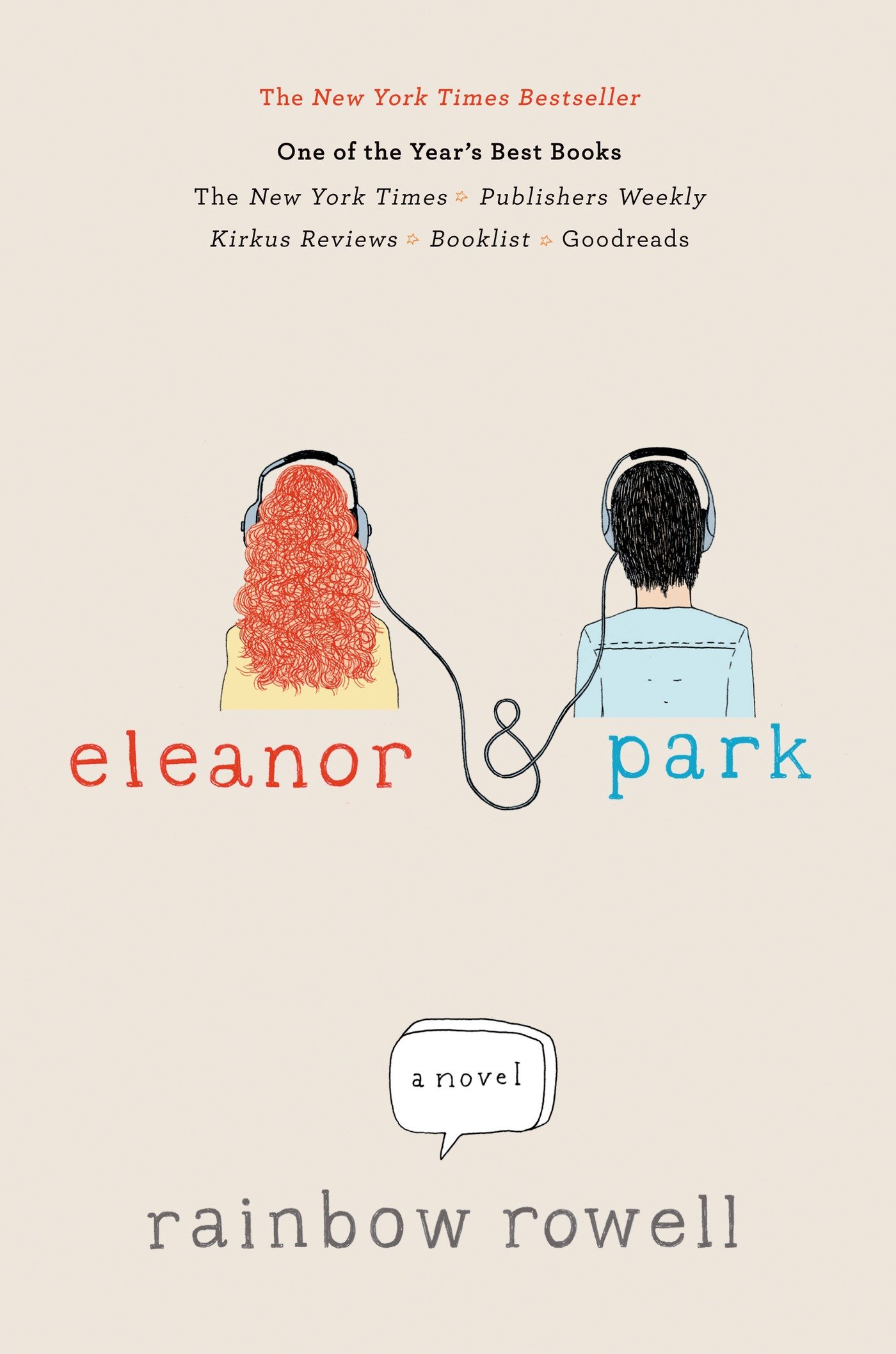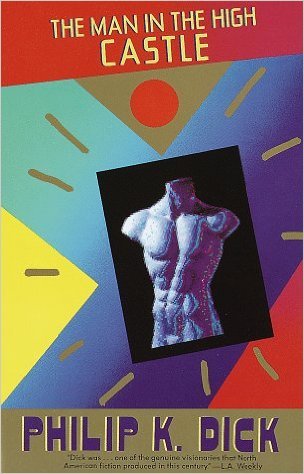 Eleanor & Park
by Rainbow Rowell
reviewed by Emily Gomez
Eleanor & Park
by Rainbow Rowell
reviewed by Emily Gomez
In Rainbow Rowell’s Eleanor & Park, two teens, living in the ‘80s, are caught up in a love that will never last. Park, a half-Korean teenager, meets Eleanor, a crazy red-haired girl, on the bus one day. Instantly, they spark a love for one another that not even 400 miles can destroy. Throughout the book, Rowell addresses controversial themes that can young adults can relate to. Also, the author switches narrative, between Eleanor and Park, every chapter as well as using immense amounts of dialogue. Through these aspects of the book, Rowell tells an impeccable story of love and danger between two teens.
Domestic and child abuse, bullying, and body image are all themes that teens going through high school understand. In the beginning of the book, Eleanor was returning to her locker when she realized, “It was covered with Kotex pads” (Rowell 54). Eleanor was the less-fortunate, poorly dressed girl in school that everyone bullied. In every school or high school there are girls or people that want to embarrass or bully another. When Eleanor gets home, “she could hear them fighting” (Rowell 278). Them as in her mother and her stepfather. Rowell talks about the domestic abuse between Eleanor’s mom and stepdad. She speaks to the fact that it is a prevalent issue and can happen to anyone. The author informs the reader the importance of knowing that these problems exist and she does it among a group of people that are the future generation, young adults.
Normal novels are told from one single perspective; however, Eleanor and Park encompasses the point-of-view of both the main characters. Every chapter and even throughout one chapter, the story switches from Eleanor to Park. This helps the reader understand the thoughts from both characters. It aids the reader in seeing and feeling what Eleanor and Park are feeling at different times. This technique also helps to project two different views or opinions the author might have. By doing this, she also increases the level of emotion within the story. Because we are seeing two stories woven in to one, there is emotion being contributed from both stories. Through the intense sensation in the book, Rowell pulls the reader into the worlds of Eleanor and Park.
Through Eleanor and Park’s story, the reader can understand the importance of body image, bullying, and domestic and child abuse as well as feel immense emotion. Rowell grabs the reader and leads him/her through a great love story where it is impossible for everyone to end up happy. She demonstrates that even though love may mask the truth, it may never be enough for some. I’d recommend this book to anyone who wants to be shown the reality of life and that not everyone is happy.
 Angela's Ashes
by Frank McCourt
reviewed by Grace Sadahiro
Angela's Ashes
by Frank McCourt
reviewed by Grace Sadahiro
In the New York Times Bestseller first person novel Angela’s Ashes by Frank McCourt, the author himself expressed his thoughts from when he was a child to a humorous, compassionate, luminous, and complicated memoir of his life during the Great Depression. Frank, growing up in Ireland, never boasted about his childhood. At a very young age, he acknowledges that his family was poor and realizes that the impact for this was all because of the father, Malachy Sr., having alcoholic problems. Frank describes the unfortunate events of his life as the novel develops.
When the book began, Frank revealed just how dreadful his childhood was, “When I look back on my childhood I wonder how I survived at all… Worse than the ordinary miserable childhood is the miserable Irish childhood, and worse yet is the miserable Irish Catholic childhood” (McCourt 11). Frank only had his mother, his father and brother both named Malachy McCourt, twin brothers Oliver and Eugene, and a deceased sister Margaret. Angela McCourt, although she had an exceedingly irresponsible husband, manifested that her first priorities were her children because she maintained great expectations for them and raised them to be well-behaved, hardworking men. Malachy McCourt Sr., on the other hand, was evidently not the most helpful or supportive father. The illness that Frank’s father had, which decreased the welfare of the family, was his uncontrolling and endangering drinking. His several alcoholic consumptions after his children’s deaths were supposed to help him numb the pain. Frank’s other siblings charmed the hearts of Angela McCourt and worked hard to try to benefit the family.
Two major themes in Angela’s Ashes were class limitations and hunger. Although Frank McCourt was intelligent, he never had the opportunities to further his education because him and his family were paupers. Frank knew what he would have experienced in school because, “People everywhere brag and whimper about the oes of their early years, but nothing can compare with the Irish version: the poverty; the shiftless loquacious alcoholic father; the pious defeated mother moaning by the fire… the English and the terrible things they did to us for eight hundred long years” (McCourt 11). No matter how hard Angela McCourt tried, Malachy (Sr.) was always keeping his family on the low-class status because of the decline of prosperity. The McCourt family was so poor that because of Malachy McCourt Sr., they were always on the low-class status. Frank wanted to learn but did not have the money to pay for schooling. Frank’s figurative hunger was to get valuable teachings. Since Mr. McCourt was always alcoholic and health problems, he took more things away from his family than just hunger. Every McCourt desired to work hard except for Malachy Sr., who never learned how to control himself.
 Angela's Ashes
by Frank McCourt
reviewed by Lilian Welwood
Angela's Ashes
by Frank McCourt
reviewed by Lilian Welwood
Angela’s Ashes, an Autobiographical bildungsroman, is an Irish story that tugs at the heart. Frank Mccourt is the son of Angela and Malachy Mccourt along with the brother of Malachy Jr, two twins Oliver and Gene, and a new baby Girl named Margaret. Frank Mccourt's story starts with the birth of the mother Angela’s birth into a catholic family, and goes on and explains her family forced marriage to the Irish man Malachy Mccourt. The story is written from the innocent young point of view of Frank Mccourt. Frank takes us through his terribly impoverished childhood, having a father that drinks away his daily wages leaving the his mother and siblings hungry, and the sudden deaths of 3 of his siblings causing his mother Angela to go into depression, Frank feels the need to take care of his family. As a young child Frank wants to “be like all the big people in the church, standing and kneeling and praying and understanding everything” (Mccourt.108) under the unrealistic impression that all adults understand everything. Throughout his childhood Frank has a real respect for adults, especially his father. Despite his drinking and little help to the family Frank’s Father Malachy Mccourt really grabs the respect and love from Frank as their relationship grows stronger through the stories and lessons he teaches his son.
The author, Frank Mccourt’s innocent and curious point of view gives the sad childhood story a refreshing and comic relief touch, that really makes reading it very enjoyable. As Frank grows up the audience really can see through the new insights and his growing knowledge that he gets wiser as time passes. Having to deal with going to school and getting jeered at for wearing old shoes nailed with squares of tire to having to walk around town on christmas eve being laughed at and called, “Frankie McCourt an’ his pig’s snout”(98) for having to carry a pig's head home for a christmas dinner, the themes in difference in societal class and perseverance are shown in a wonderful ways through the eyes of McCourt's child and young adult self. Overall I enjoyed Frank McCourt's story telling.
 Tell the Wolves I'm Home
by Carol Rifka Brunt
reviewed by Kysa Hayashi
Tell the Wolves I'm Home
by Carol Rifka Brunt
reviewed by Kysa Hayashi
Tell the Wolves I’m Home, a New York bestseller, contemporary fiction, by Carol Rifka Brunt unfolds a story of two unlikely lonely people becoming the best of friends through grief, love, and the loss of their first love. June Elbus, a fourteen-year-old, had one true friend, her uncle, the well-known painter Finn Weiss. Shy and distant with her family and friends, June is struck with horror and disbelief when her uncle Finn dies of AIDS. June and others blame Finn’s boyfriend, Toby for his death. Toby, Finn’s boyfriend, relied on Finn for support and love. He too felt horror and disbelief. Between notes and conversations, June and Toby meet. They are the most important people to Finn. Can two broken people find each other and heal each other for the sake of their lost loved one?
Carol Rifka Brunt uses brilliant metaphor and imagery throughout the book about wolves. As the title being Tell the Wolves I’m Home there will be connections of wolves. Brunt has multiple ways of using wolves in her novel. Whenever June goes through an emotional event she has a sleepless nights of wolves. “hovering over my bed.. Teeth sloppy with drool.” (Brunt 250) The wolves describe her anxiety and fear of her decision making in the novel. June has problems with people talking about AIDS. The wolves in the woods describe people with AIDS who just want to be left alone. “leave them alone.. They never did anything to you.” (257-258) The biggest metaphor is the title of the book. Throughout the book June develops as a character to let things happen and that she cannot change anybody. Before and After her uncle's death, he teachers her threw his paintings and letters that June has to not be afraid of her choices and to be brave hence the title being Tell the Wolves I’m Home. By reading the book readers see a portal into the 80’s through June.
 The Adoration of Jenna Fox
by Mary E. Pearson
reviewed by Chase Hayes
The Adoration of Jenna Fox
by Mary E. Pearson
reviewed by Chase Hayes
In Mary E. Pearson’s The Adoration of Jenna Fox the reader is taken on a teenager’s road to recovery told in first person by Jenna Fox. Jenna is a 17 year old girl who has just woken up from a year-long coma. She finds herself in a new home with no friends, not able to eat real food, and with no memories. Over time, Jenna develops tons of questions and starts wondering what happened to her and why. Her family won’t give her answers. Instead, they just give her video discs of her life before her accident. On her own, she slowly begins to remember bits and pieces of her past. One day Jenna wandered out of her house and met her neighbor, Clayton Bender. That was the first person she had talked to other than her family while out of coma. After begging her mom to let her go back to school, Jenna enrolled in a very small charter school that was “nothing more than an abandoned real estate office” (Pearson 65). Jenna was brought into a classroom full of furniture and three students. With the help of her few classmates and her neighbor Clayton Bender, she was able to connect the dots and uncover details of the accident that nearly killed her.
I loved this book and would totally recommend it to others who love science fiction. You won’t want to put it down. Pearson does an amazing job of describing everything with great detail by using literary devices, which helps you see and understand what Jenna talks about. Pearson uses the metaphor, “Her eyes are glassy puddles” (Pearson 48) to show how sad Jenna’s mother is that Jenna is going to school on her own. Pearson uses personification as Jenna describes what some of the buildings in her neighborhood look like after an earthquake by saying, “we pass a toppled building, it's rubble being eaten by weeds, and vines” (Pearson 85). By describing it that way, the reader is able to picture the ruins of the shaken building.
 The Man in High Castle
by Philip K. Dick
reviewed by Abigail Lewis
The Man in High Castle
by Philip K. Dick
reviewed by Abigail Lewis
Philip K. Dick immerses the reader in an exciting adventure through America’s 1960s when Japan and Germany won World War Ⅱ. The Man in the High Castle creates a world where Jews must change and hide their credentials, original American people must yield their dignity to the Japanese controllers, and there is a constant fear of revealing true identities. Mr. Tagomi, a deeply spiritual, high ranking Japanese government official, enjoys buying spiritual trinkets. He buys them from Robert Childan, who supplies them from an aspiring jeweler, Frank Frink. Juliana Frink, formerly married to Frank Frink, dates Joe Cinadella who works as a Natzi assassin to kill Howthorne Abendsen. Abendsen wrote the book, The Grasshopper Lies Heavy, a widely read, but outlawed book about what the world would be like if the Allies won the war. All the characters read the book, leading them to wonder what their lives would be like if the Allies won the war. They imagine equality between all people, religious freedom, democracy, and a sense of safety. As a result, Juliana Frink wonders if the book’s author knows the truth about this alternative world and therefore she sets out to find him. At the same time, Natzi’s also look for Abendsen. They want to kill him for spreading knowledge of a better life when they are not in control of the people in America. They want to silence this uproar of knowledge of a better life. The Man in the High Castle creates an alternative reality that helps the reader understand that knowledge creates mental, physical, and emotional power and strength.
Dick uses personal thoughts, perspective, and different character’s point of views to compare and contrast character's knowledge of a life where the Allies won the war or not, strengthening his theme of a better world because the Allies won. Dick uses third person to show how different characters act according to which side of the war they side with. Juliana describes Joe, “once more engrossed in the Grasshopper, scowling as he read, unaware of everything else”(Dick 149). The reader picks up on context clues that Joe’s character, who sides with Germany and Japan winning, resembles a rash and morally bad person. In addition, Dick uses single words through his novel to show his appreciation that the Allies won. Again, he describes Joe’s ignorance as, “unaware of everything else”(149). To emphasize the point, clear implications that ignorance leaves characters brainwashed and uninformed strongly shows when Dick writes in multiple character’s point of views and stories. Childan contemplates that , “It was out of the question to let a slave see him carrying something...he would never have place of any sort again” (23). Through the use of different character’s experiences in this society, the reader understands that he or she feels fortunate to not have to live in a society based on fear and social classes. Dick’s use of character's inner thoughts versus outside thoughts creates an unbiased argument for his vision of a correct society to show which characters are accepting of the new society and which are not.
 Eleanor & Park
Eleanor & Park 



